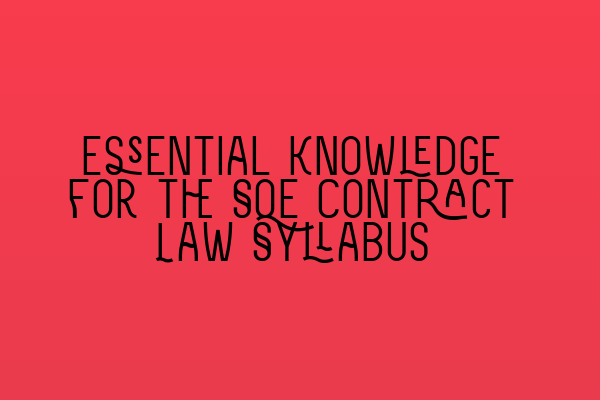Essential Knowledge for the SQE Contract Law Syllabus
Are you preparing for the SQE Contract Law exam and feeling overwhelmed by the amount of material you need to cover? Look no further, as we have compiled a list of essential knowledge that you need to focus on in order to succeed in the exam. This comprehensive guide will help you understand the key concepts and principles of contract law, ensuring that you are well-prepared for the exam.
1. Offer and Acceptance: Understanding the process of offer and acceptance is crucial in contract law. You need to know how an offer is made, how it can be accepted, and what constitutes a valid acceptance. These concepts are the foundation of any contract and will be tested extensively in the exam.
2. Consideration: Consideration refers to something of value that is exchanged between the parties to a contract. You should be familiar with the different types of consideration, such as money, goods, or services, and understand how consideration is necessary for a contract to be enforceable.
3. Intention to Create Legal Relations: In contract law, there must be an intention to create legal relations between the parties. You should be able to identify situations where this intention is present and those where it may be lacking. This knowledge will help you analyze and determine the enforceability of a contract.
4. Terms of a Contract: Understanding the different types of terms in a contract is essential. You should be able to differentiate between conditions, warranties, and innominate terms. Additionally, you should be familiar with the rules regarding the interpretation, implication, and exclusion of terms.
5. Capacity and Privity: Contract law deals with the capacity of parties to enter into a contract and the issue of privity of contract. You need to know the legal requirements for a party to have capacity to contract and the significance of privity in determining rights and obligations under a contract.
6. Misrepresentation, Mistake, and Duress: These concepts encompass situations where the formation of a contract may have been affected by misrepresentation, mistake, or duress. You should understand the different types of misrepresentation, how mistake can render a contract void or voidable, and the impact of duress on the enforceability of a contract.
7. Discharge of a Contract: The methods by which a contract can be discharged are important to know for the exam. You should be familiar with the concepts of performance, agreement, frustration, and breach of contract, as well as their respective implications.
8. Remedies for Breach of Contract: Understanding the remedies available for breach of contract is vital. This includes familiarizing yourself with damages, specific performance, injunctions, and the doctrine of mitigation. Knowing when and how to claim these remedies is crucial in contract law.
By focusing on these key areas of contract law, you will be well-positioned to tackle the SQE Contract Law exam with confidence. Remember to practice with sample questions and mocks exams to test your understanding and improve your exam technique.
For further preparation resources, we highly recommend checking out the following articles:
– [SQE 1 Practice Exam Questions](https://fqps.co.uk/sqe/sqe1-preparation/mcq-practice-quiz)
– [SQE 1 Practice Mocks FLK1 FLK2](https://fqps.co.uk/sqe/sqe1-preparation/practice-mocks-quiz)
– [SQE 2 Preparation Courses](https://fqps.co.uk/sqe/sqe2-preparation)
– [SQE 1 Preparation Courses](https://fqps.co.uk/sqe/sqe1-preparation)
– [SRA SQE Exam Dates](https://fqps.co.uk/sqe/sqe1-sqe2-exam-dates)
These resources will complement your study efforts and help you achieve the best possible results in the SQE Contract Law exam. Good luck with your preparations!
